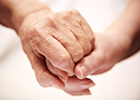 February 2015—
February 2015—
Several weeks ago, I gave a talk to parents with young children on how to live a healthy lifestyle. Approximately 25 minutes into the talk a sweet 3-year-old girl with medium-brown hair in pigtails quietly walked into the room and took a seat next to her mother. Moments prior to her entrance, I had presented the following question to the parents: “What kinds of things do you do to relax when you feel stressed?” The audience avoided eye contact with me, looked around the room and pretended that they needed to check their Blackberrys at that exact moment all in effort to avoid answering my question.
I decided to ask the question again…silence.
As I continued to survey the room, my eyes slowly met with those of the 3-year-old girl. I looked at this little girl in pigtails and asked for her name…“Lyla,” she answered shyly. I proceeded to ask Lyla if she ever feels stressed? She looked directly at me with bright brown eyes and answered my question with ease… “Definitely!” she proclaimed. It took me a moment to grasp my head around the fact that someone so young could even begin to understand what it meant to feel stressed.
I then asked Lyla the same question that I asked the parents moments prior to Lyla’s seemingly inconspicuous entrance…“What kind of things to you like to do when you feel stressed,” I asked. Without hesitation, Lyla quickly, with a matter-of-fact tone answered, “I just put on my pink dress.” So simple. Just to clarify, I asked “So all you need to do when you feel stress is put on your pink dress and all of your stress melts away?” She answered softly, yet with genuine confidence, “Yeah, I just put on my pink dress.”
This innocent exchange got me thinking…where is my pink dress? Perhaps, finding a reliable way to relax is easier than we think. Maybe we are trying too hard to relax. When Lyla talked about her pink dress, she breathed diaphragmatically without intention. It appeared that even thinking about this dress served to naturally induce a relaxation response for this little girl.
To be clear, I am not suggesting that you (regardless of gender) go out and buy a pink dress. What I do suggest is to take about 10 minutes to sit down and think about an item or activity that you find relaxing. Think about your senses: whether it’s wrapping yourself up in a warm fuzzy blanket, spritzing on your favorite perfume or cologne so you can smell it throughout the day, listening to a song that you find soothing, taking a sip of hot or iced tea, petting your dog or cat, holding a memento (i.e., a favorite photo, a sentimental object), notice how both your mind and body feel as you engage in any of the above-noted activities.
As I have mentioned in previous articles, the more our society increases its desired, unrealistically fast pace, the more important it becomes for you to take a moment and breathe. The items and activities mentioned above oftentimes serve as “triggers.” Implementing a simple, yet meaningful object or activity into your daily routine may serve to naturally induce a relaxation response with little to no effort.
Have a great month & as always don’t forget to breathe!

 January, 2015 — STRESS. A word in which we are all too familiar. It seems as if the pace of our society becomes quicker with each passing moment, ultimately causing each of us to experience unnaturally high levels of stress on a regular basis. Routine exposure to such high levels of stress produces physiological and psychological reactions. The development of a weakened immune system, high blood pressure, extreme fatigue, difficulty concentrating, anxiety, and depression are just a few examples of the mental and physical effects of stress on the human body.
January, 2015 — STRESS. A word in which we are all too familiar. It seems as if the pace of our society becomes quicker with each passing moment, ultimately causing each of us to experience unnaturally high levels of stress on a regular basis. Routine exposure to such high levels of stress produces physiological and psychological reactions. The development of a weakened immune system, high blood pressure, extreme fatigue, difficulty concentrating, anxiety, and depression are just a few examples of the mental and physical effects of stress on the human body. When an individual is exposed to a stressful stimulus, they may react in many ways. The actual physiological response frequently prompted by this stressful stimulus is known as, “fight or flight.” Stress management involves the teaching of various effective techniques & therapies geared toward controlling perceived/experienced levels of stress. Through the learning of such techniques, the individual becomes equipped w/ personalized effective coping mechanisms to increase one’s overall quality of life. People have significantly more control over how they experience and react to stressful situations than they give themselves credit.
When an individual is exposed to a stressful stimulus, they may react in many ways. The actual physiological response frequently prompted by this stressful stimulus is known as, “fight or flight.” Stress management involves the teaching of various effective techniques & therapies geared toward controlling perceived/experienced levels of stress. Through the learning of such techniques, the individual becomes equipped w/ personalized effective coping mechanisms to increase one’s overall quality of life. People have significantly more control over how they experience and react to stressful situations than they give themselves credit. Mind/Body Wellness
Mind/Body Wellness Sleep Hygiene
Sleep Hygiene Anxiety Disorders
Anxiety Disorders Depression
Depression Mourning and Loss
Mourning and Loss Grief
Grief Medical/Health Psychology
Medical/Health Psychology Mindfulness/Meditation
Mindfulness/Meditation November 16, 2014 — By Dr. Ellyn L. Turer, Psy.D. — I obtained a doctorate in clinical psychology to work with individuals diagnosed with an illness or injury as well as their families to help cope with the emotional/mental ramifications of having an illness/injury or being involved with such an individual. Throughout the course of the six years it took to officially become “Dr. Turer,” the toxic effect that stress has on the human body became increasingly apparent.
November 16, 2014 — By Dr. Ellyn L. Turer, Psy.D. — I obtained a doctorate in clinical psychology to work with individuals diagnosed with an illness or injury as well as their families to help cope with the emotional/mental ramifications of having an illness/injury or being involved with such an individual. Throughout the course of the six years it took to officially become “Dr. Turer,” the toxic effect that stress has on the human body became increasingly apparent. Dr. Ellyn L. Turer is a licensed clinical psychologist in the Washington, D.C. and Maryland areas, specializing in integrated
Dr. Ellyn L. Turer is a licensed clinical psychologist in the Washington, D.C. and Maryland areas, specializing in integrated